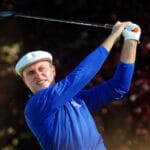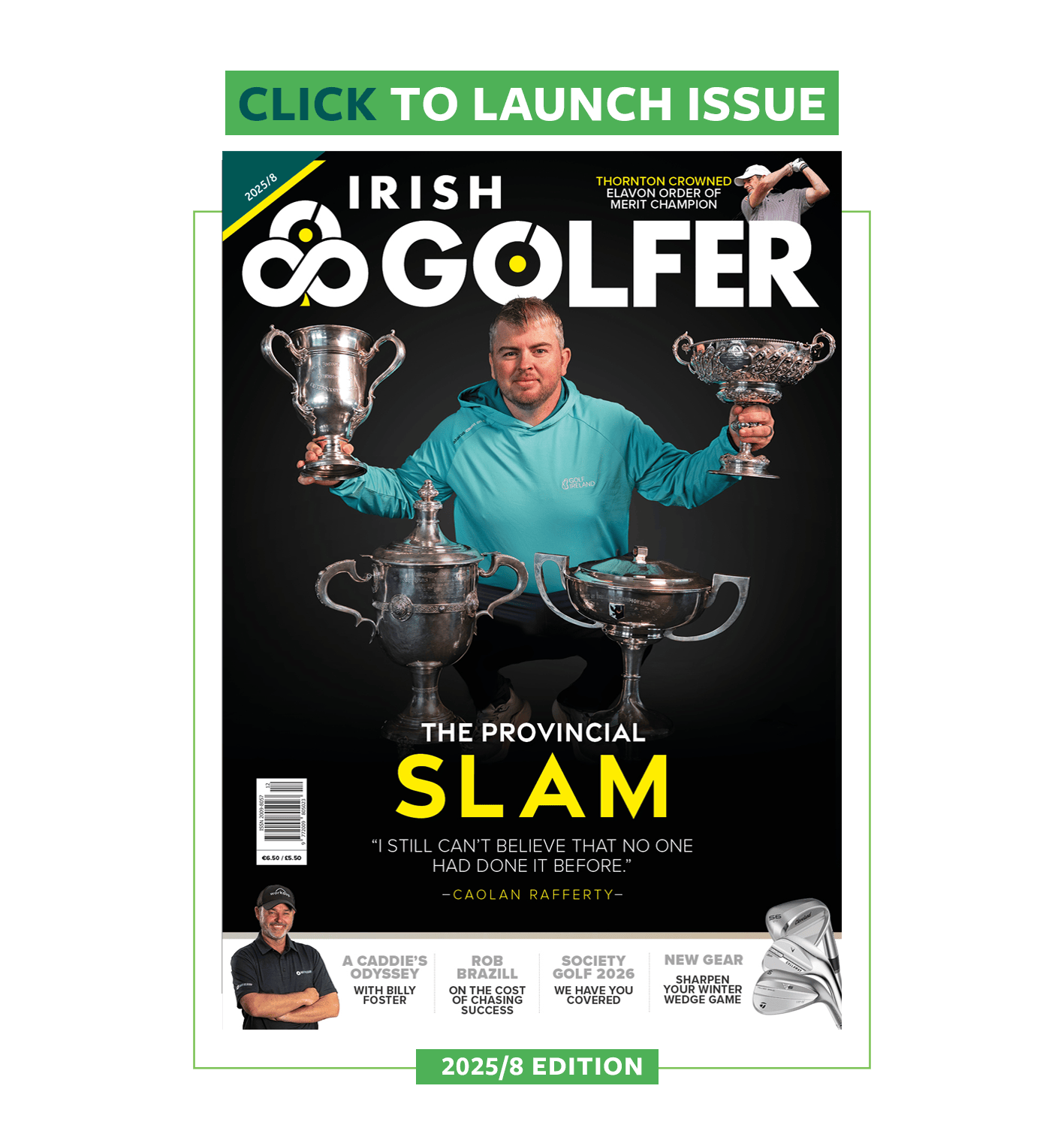During his amateur career, Noel Fox amassed six GUI major championships, played number one for Ireland and tasted success on the biggest stage when winning the Walker Cup with Great Britain and Ireland at Ganton in 2003. Now a highly regarded PGA coach, Fox reflects on his illustrious playing career and the championships that shaped him as a player.
HOW DID YOU GET STARTED IN GOLF?
Like most kids, it was a parent who introduced me to golf. Once I was strong enough to be able to pull my dad’s trolley, that’s where I went. Once I got out of sight of the clubhouse, I was able to hit a couple of shots. It meant the world to me because I knew that Portmarnock was a special place to my dad and for me to spend time with him there was amazing. And it was just the best buzz ever.
WHO WERE YOUR MAJOR INFLUENCES GROWING UP?
Peter Townsend was the professional in Portmarnock and Mickey Lynch was the professional in Sutton, two genuinely great players in their own right, especially Peter – Walker Cup, Ryder Cup and a multiple tour winner. Later on I used to go caddy for Peter and I loved that. He was one of the best ball strikers, even to this day, that I ever saw.
WHAT ARE YOUR MEMORIES OF GOLF IN PORTMARNOCK?
When they used to rotate the Irish Open between Portmarnock and Royal Dublin, you had the likes of Greg Norman who used to come over to Portmarnock to get a bit of peace and quiet. I remember one evening watching Seve in the days when the caddy used to go out and shag the balls. The caddy was just standing up the first fairway of the new nine at Portmarnock and Seve’s beside the pitching green, just hitting shot after shot up at the caddy. And the caddy doesn’t have to move very far to collect the balls. It was a beautiful summer’s evening. You can’t buy days like that.
WHAT WAS YOUR FIRST COMPETITION?
My first GUI event was the Leinster Under-15 Boys at The Island. The first year I played in it I was 13. I didn’t feature but then the following year (1988) I ended up winning. That was my first exposure to what genuine competition was. I got a buzz out of winning.
WHEN DID GOLF BECOME MORE THAN A HOBBY?
I probably never did well enough to be a complete stand-out player as a boy. I would have always been a fringe pick for Ireland and I found that really tough. The fringe picks went against me but in hindsight that was a great thing because you shouldn’t be relying on someone else’s opinion of your game to get a pick. I realised if you shoot scores no one can ignore you. And if you play well enough, you don’t have to rely on someone else’s opinion to get picked.
WHAT WAS IT LIKE WINNING SENIOR CUP IN 1995?
Senior Cup is an amazing championship. It’s such a great schooling. When your team and your club are relying on you, that’s proper pressure. We played Co Sligo in the final at Portstewart. I played Ken Kearney in the final and it was the key match, I won it on 18. That was a great feeling. It was really windy but it was really sunny. I remember just sitting on the wall of the clubhouse and someone gave me a cold bottle of Bulmers. I was thinking: ‘Life doesn’t get any better than this.’

Fox with the East of Ireland Trophy / Image from GUI
YOU MADE YOUR BREAKTHROUGH AT THE EAST OF IRELAND IN 1996 – WHAT WAS THE KEY TO THAT?
I remember in 1995 I played nicely in the East, I shot five under in one of the rounds. Paddy Gogarty was the Senior Cup captain in Portmarnock and he told me to do an analysis of my cards. He said: ‘You made enough birdies to win the championship. Figure out why you made the bogeys and you’ll do just fine.’ I had the potential to win a championship but I had to figure out why I hadn’t done it.
I only made the cut on the mark in 1996 at the East. I played nicely on the final day and then incredibly bad weather came in. To put it in context, I was finished as the leaders were teeing off. I had quite a long wait. I really didn’t think I was going to win at that point.
Then as the scores were coming in off the course, it looked like I might finish higher than I thought. With about 40 minutes of play left, I started to hit a few shots in case there was a playoff. I ended up winning by one. It was great but I didn’t have to play with a lead. I was fortunate. It was only when I came back to Portmarnock that I knew what a big deal it was. I was practicing a few days later and Joe Carr comes up and says: ‘I’m sure you’ll win plenty of these.’ He was another complete legend in my life. It really hit home for me the magnitude of them within Irish golf. It’s a special thing to say you’ve won a championship.
WHAT ARE YOUR MEMORIES OF WINNING THE WEST OF IRELAND IN 1998?
The West was played at Enniscrone that year because they were doing work on the course at Co Sligo. The way I played in practice, I thought I was better off jumping back in the car. As each match went on, my game started to develop. I played against Jody Fanagan in the semi-final, which was huge for me because he was someone who I really looked up to. At that point he’d played Walker Cup and beaten Tiger Woods. He was a class player and that was a really big win for me. I beat Pat Lyons in the final. I had a long drive home on my own to digest it all. That was a nice journey, looking in the mirror and seeing the trophy.
WITH IRELAND YOU PLAYED ALONGSIDE THE LIKES OF GARTH MCGIMPSEY, JODY FANAGAN AND RICHIE COUGHLAN. WHAT DID YOU LEARN FROM THEM?
I got my first senior cap in 1996. There was a real mix to some of the early teams, which I think we all really enjoyed. We picked up a lot from the older, more experienced guys and they picked up a little bit of energy from us.
Going to Home Internationals with a bank of experience really put the younger lads at ease. Even the atmosphere around the dinner table at night… you were constantly picking up things from the older guys. There was a real desire to win. For them, success wasn’t making the team: the success was being on a winning team.
WHAT DID IT MEAN TO WIN BOTH THE IRISH AMATEUR AND THE EAST OF IRELAND IN 2000?
Winning the Irish Amateur at Royal Dublin was one of those experiences where I didn’t really want to celebrate. I felt that I just did my job. I was playing well on a course where I felt really comfortable. I always felt I had an advantage when I got to the 10th tee in Royal Dublin. I hit the ball with less spin and that made the back nine play a lot shorter. Unfortunately for me, as the years went on, the engineers figured out how to make everyone hit the ball with less spin.
After winning the Irish Amateur, there was a bit more focus on me at the East. I think the golfing gods were with me. I ended up in a playoff with my good pal, Mark Murphy. I was over the back of the second green and kind of dead. There was an element of hit and hope, and my pitch ended going stone dead so in a situation where I looked like I was going a shot behind, I ended up going a shot ahead. Winning the East in 2000 gave me a lot of pleasure because I felt to have won two titles in a year was really something.
WHAT STANDS OUT ABOUT WINNING THE EAST OF IRELAND IN 2002?
I shot 64 in the second round and that’s one of my great rounds. I had a lot of control over my game. Some funny things happened. I was using Callaway prototype wedges and two of them broke so I was just really fearful that I wouldn’t end up in a bunker
WHAT WAS IT LIKE TRYING TO MAKE THE WALKER CUP TEAM IN 2003?
We felt, as Irish players, and this is probably a good thing, that we always had to do a little bit more. And we had to feature in the big events. There’s no harm in that. The fact that I ended up playing foursomes with Colm Moriarty and we did well, that kind of sticks in the head of selectors for a Walker Cup team.
We played against Nigel Edwards and Stuart Manley of Wales at the 2003 Home Internationals and we knew what was on the line. It was effectively a trial for the Walker Cup team. We played really nicely and beat them on the last.
I remember when Garth McGimpsey phoned me about the Walker Cup: ‘You’re going to get a lot of praise for making this team but there’s a big difference between being on a winning Walker Cup team and a losing Walker Cup team. I want you to prepare yourself to be a member of a winning team.’
HOW DID THE EXPERIENCE OF PLAYING IN GUI CHAMPIONSHIPS SHAPE YOU AS A PLAYER?
Playing in Irish championships, what we realised was: good golf is good golf. And our championship courses are some of the best in the world so if you can shoot a score and perform on them, there’s no reason if you go to Royal Troon for a British Amateur, that you shouldn’t perform over there.
What was great for Irish players in my time was the fact that the Irish Amateur Open started to attract stronger fields. And we were finishing higher up on the leader-board than international players.
WHAT IS THE BIGGEST CHALLENGE MOVING INTO PROFESSIONAL GOLF?
Professional golf is a very lonely place. If you don’t play well, no one cares and unfortunately, some people are even happy. It is cutthroat. It’s a meritocracy. You play well you get paid. If you don’t play well, you don’t get paid.
If you don’t hit the ground running, it’s really tough and you can get disillusioned pretty quick. Doubt seeps in and you build up scar tissue. That’s tough to get by.
WHAT PROMPTED YOUR MOVE INTO COACHING?
The game still fascinates me and it will always fascinate me. I want to see people enjoy it. I want people to get as much out of it as I did. I don’t know any golfer that doesn’t want to get better and that’s the bottom line.
In terms of knowledge base, I’ve never encountered anyone like Pete Cowen. When I stopped playing, he was encouraging. He told me: ‘Failed players make great coaches.’ There’s no point asking Rory McIlroy how he hits a high, four iron because he doesn’t know how and the day he figures it out, he’s probably done.
IF YOU HAD YOUR TIME OVER, WHAT WOULD YOU DO DIFFERENTLY?
Now that I’ve done a bit of coaching, I wish someone had highlighted the importance of the clubface to me. When I look back, the best players were able to control their clubface at impact. What you need, to be a great player, is a stable clubface. I would have been way more focused on that rather than relying on good timing all the time. If I had my time over I think I would have been a lot more consistent and with consistency comes opportunity.
























Leave a comment